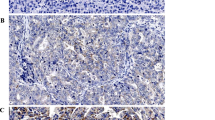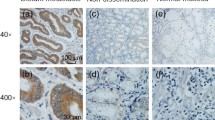Abstract
Objective
The aim of this study was to detect metastasis-associated in colon cancer-1 (MACC1) expression in Chinese gastric cancer and analyze the relationship between MACC1 expression and postoperative survival.
Methods
The expression of MACC1 and c-MET protein in a sample of 128 gastric cancer tissues was detected by immunohistochemistry. A retrospective cohort study on the prognosis was carried out and data were collected from medical records.
Results
The positive rate of MACC1 protein expression in gastric cancer was 47.66%, higher than that in adjacent noncancerous mucosa (P<0.001). MACC1 protein expression was not related to the clinicopathological variables involved. Kaplan-Meier analysis revealed that the survival of MACC1 positive group tended to be better than that of MACC1 negative group, particularly in patients with stage III carcinoma (P=0.032). Cox regression analysis revealed that MACC1 protein over-expression in gastric cancer tended to be a protective factor with hazard ratio of 0.621 (P=0.057). Immunohistochemical analysis showed that the positive rate of c-MET protein expression was much higher in cases with positive MACC1 expression in gastric cancer (P=0.002), but P53 expression was not associated with MACC1 expression.
Conclusion
MACC1 over-expression implies better survival and may be an independent prognostic factor for gastric cancer in Chinese patients.
Similar content being viewed by others
References
Siewert JR, Bottcher K, Stein HJ, et al. Relevant prognostic factors in gastric cancer: ten-year results of the German Gastric Cancer Study. Ann Surg 1998;228:449–461.
Iwanicki-Caron I, Di Fiore F, Roque I, et al. Usefulness of the serum carcinoembryonic antigen kinetic for chemotherapy monitoring in patients with unresectable metastasis of colorectal cancer. J Clin Oncol 2008;26:3681–3686.
Ishigami S, Sakamoto A, Uenosono Y, et al. Carcinoembryonic antigen messenger RNA expression in blood can predict relapse in gastric cancer. J Surg Res 2008;148:205–209.
Yamamoto M, Baba H, Toh Y, et al. Peritoneal lavage CEA/CA125 is a prognostic factor for gastric cancer patients. J Cancer Res Clin Oncol 2007;133:471–476.
Kim HJ, Lee KW, Kim YJ, et al. Chemotherapy-induced transient CEA and CA19-9 surges in patients with metastatic or recurrent gastric cancer. Acta Oncol 2009;48:385–390.
Takahashi Y, Takeuchi T, Sakamoto J, et al. The usefulness of CEA and/or CA19-9 in monitoring for recurrence in gastric cancer patients: a prospective clinical study. Gastric Cancer 2003;6:142–145.
Kochi M, Fujii M, Kanamori N, et al. Evaluation of serum CEA and CA19-9 levels as prognostic factors in patients with gastric cancer. Gastric Cancer 2000;3:177–186.
Ubukata H, Katano M, Motohashi G, et al. Evaluation of CA72-4 as a tumor marker in patients with gastric cancer. Gan To Kagaku Ryoho 2003;30:1821–1824.
Sheng SL, Wang Q, Huang G. Development of time-resolved immunofluorometric assays for CA 72-4 and application in sera of patients with gastric tumors. Clin Chim Acta 2007;380:106–111.
Goral V, Yesilbagdan H, Kaplan A, et al. Evaluation of CA 72-4 as a new tumor marker in patients with gastric cancer. Hepatogastroenterology 2007;54:1272–1275.
Fernandes LL, Martins LC, Nagashima CA, et al. CA72-4 antigen levels in serum and peritoneal washing in gastric cancer. Correlation with morphological aspects of neoplasia. Arq Gastroenterol 2007;44:235–239.
Ozkan H, Kaya M, Cengiz A. Comparison of tumor marker CA 242 with CA 19-9 and carcinoembryonic antigen (CEA) in pancreatic cancer. Hepatogastroenterology 2003;50:1669–1674.
Ucar E, Semerci E, Ustun H, et al. Prognostic value of preoperative CEA, CA 19-9, CA 72-4, and AFP levels in gastric cancer. Adv Ther 2008;25:1075–1084.
Gao YC, Yuan ZB, Yang YD, et al. Effect of freeze-thaw cycles on serum measurements of AFP, CEA, CA125 and CA19-9. Scand J Clin Lab Invest 2007;67:741–747.
Stein U, Walther W, Arlt F, et al. MACC1, a newly identified key regulator of HGF-MET signaling, predicts colon cancer metastasis. Nat Med 2009;15:59–67.
Stein U, Dahlmann M, Walther W. MACC1-more than metastasis? Facts and predictions about a novel gene. J Mol Med 2009;88:11–18.
Kokoszynska K, Krynski J, Rychlewski L, et al. Unexpected domain composition of MACC1 links MET signaling and apoptosis. Acta Biochim Pol 2009;56:317–323.
Stein U, Smith J, Walther W, et al. MACC1 controls Met: what a difference a Sp1 site makes. Cell Cycle 2009;8:2467–2469.
Wierstra I. Sp1: emerging roles—beyond constitutive activation of TATA-less housekee** genes. Biochem Biophys Res Commun 2008;372:1–13.
Yuezheng Zhang, Lianhai Zhang, Yang Gao, et al. Discovery and validation prognostic markers in gastric cancer by genome-wide expression profiling. World J Gastroenterol 2010.
American Joint Committee on Cancer: Gastric Cancer. AJCC Cancer Staging. Manual, 2002, 6th ed. pp. 99–103. New York: Springer-Verlag.
Zhang M, Zhang H, Ma Y, et al. Prognosis and surgical treatment of gastric cancer invading adjacent organs. ANZ J Surg 2010;80:510–514.
Moghimi-Dehkordi B, Safaee A, Zali M R. Survival rates and prognosis of gastric cancer using an actuarial life-table method. Asian Pac J Cancer Prev 2008;9:317–321.
Santoro R, Carboni F, Lepiane P, et al. Clinicopathological features and prognosis of gastric cancer in young European adults. Br J Surg 2007;94:737–742.
Maehara Y, Kakeji Y, Oda S, et al. Time trends of surgical treatment and the prognosis for Japanese patients with gastric cancer. Br J Cancer 2000;83:986–991.
Prat M, Narsimhan RP, Crepaldi T, et al. The receptor encoded by the human c-MET oncogene is expressed in hepatocytes, epithelial cells and solid tumors. Int J Cancer 1991;49:323–328.
Okamoto W, Okamoto I, Yoshida T, et al. Identification of c-Src as a potential therapeutic target for gastric cancer and of MET activation as a cause of resistance to c-Src inhibition. Mol Cancer Ther 2010;9:1188–1197.
Benvenuti S, Comoglio PM. The MET receptor tyrosine kinase in invasion and metastasis. J Cell Physiol 2007;213:316–325.
Shimazaki K, Yoshida K, Hirose Y, et al. Cytokines regulate c-Met expression in cultured astrocytes. Brain Res 2003;962:105–110.
Holgren C, Dougherty U, Edwin F, et al. Sprouty-2 controls c-Met expression and metastatic potential of colon cancer cells: sprouty/c-Met upregulation in human colonic adenocarcinomas. Oncogene 2010;29:5241–5253.
Kuniyasu H, Yasui W, Kitadai Y, et al. Frequent amplification of the c-met gene in scirrhous type stomach cancer. Biochem Biophys Res Commun 1992;189:227–232.
Kaji M, Yonemura Y, Harada S, et al. Participation of c-met in the progression of human gastric cancers: anti-c-met oligo-nucleotides inhibit proliferation or invasiveness of gastric cancer cells. Cancer Gene Ther 1996;3:393–404.
Amemiya H, Kono K, Itakura J, et al. c-Met expression in gastric cancer with liver metastasis. Oncology 2002;63:286–296.
Nakajima M, Sawada H, Yamada Y, et al. The prognostic significance of amplification and overexpression of c-met and c-erb B-2 in human gastric carcinomas. Cancer 1999;85:1894–1902.
Drebber U, Baldus SE, Nolden B, et al. The over-expression of c-met as a prognostic indicator for gastric carcinoma compared to p53 and p21 nuclear accumulation. Oncol Rep 2008;19:1477–1483.
Uen YH, Lin SR, Wu CH, et al. Clinical significance of MUC1 and c-Met RT-PCR detection of circulating tumor cells in patients with gastric carcinoma. Clin Chim Acta 2006;367:55–61.
Author information
Authors and Affiliations
Corresponding author
Additional information
This work was supported by the grants of the Foundation from Bei**g Municipal Committee of Science and Technology (No. D0905001040631), and the Scientific Research Foundation for the Returned Overseas Chinese Scholars from Ministry of Education of China.
Rights and permissions
About this article
Cite this article
Ge, Sh., Wu, Xj., Wang, Xh. et al. Over-expression of metastasis-associated in colon cancer-1 (MACC1) associates with better prognosis of gastric cancer patients. Chin. J. Cancer Res. 23, 153–159 (2011). https://doi.org/10.1007/s11670-011-0153-9
Received:
Accepted:
Published:
Issue Date:
DOI: https://doi.org/10.1007/s11670-011-0153-9




